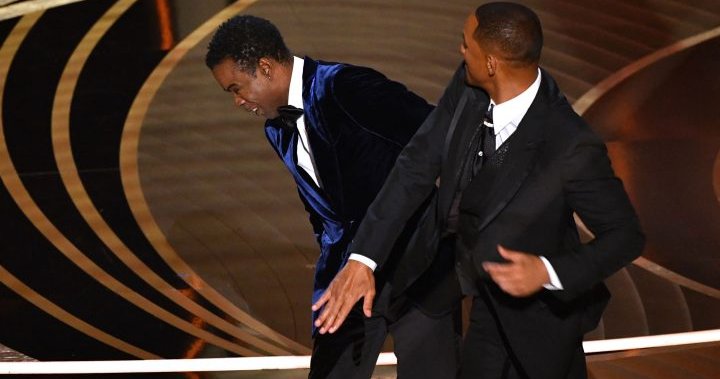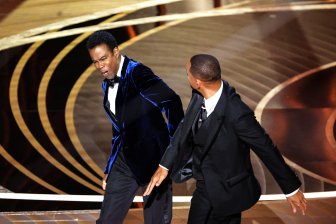The day after slapping Chris Rock on the stage of the 94th Academy Awards, Will Smith issued an apology to the comedian, the academy and viewers at home, saying he was “out of line” and that his actions are “not indicative of the man I want to be.”
The fallout of Sunday’s show continued Monday as the Academy of Motion Pictures Arts and Sciences condemned Smith’s onstage assault and said it would launch an inquiry into it. Later in the day, Smith gave a stronger apology than he did in his best actor acceptance speech, which notably didn’t include apologizing to Rock.
Read more:
Will Smith slap: Actor hitting Chris Rock at Oscars prompts LAPD statement, flood of memes
“Violence in all of its forms is poisonous and destructive,” said Smith. “My behavior at last night’s Academy Awards was unacceptable and inexcusable. Jokes at my expense are a part of the job, but a joke about Jada’s medical condition was too much for me to bear and I reacted emotionally. I would like to publicly apologize to you, Chris. I was out of line and I was wrong. I am embarrassed and my actions were not indicative of the man I want to be. There is no place for violence in a world of love and kindness.”
Smith added apologies to the film academy, producers of the telecast, attendees, viewers and the Williams family. Smith was honored for his role as Richard Williams, father of Venus and Serena.
“I am a work in progress,” added Smith.

Earlier Monday, the film academy said: “The Academy condemns the actions of Mr. Smith at last night’s show. We have officially started a formal review around the incident and will explore further action and consequences in accordance with our bylaws, standards of conduct and California law.”
The fallout from Smith’s onstage assault continued Monday, as Hollywood and the public continued to wrestle with a moment that stunned the Dolby Theatre crowd and viewers at home, and may have passed all others _ even that gold-standard flub, EnvelopeGate _ in Academy Awards infamy.
Smith shocked the Dolby Theatre crowd and viewers at home when he took the stage during Rock’s remarks after the comedian made a joke about Jada Pinkett Smith, Smith’s wife. Rock said, “Jada, I love you. `G.I. Jane 2,’ can’t wait to see it.”
The joke touched a nerve. Pinkett Smith, whose head is shaved, has spoken publicly about her alopecia diagnosis. Smith strode on stage and slapped Rock across the face. Back in his seat, Smith twice shouted for Rock to “get my wife’s name out your (expletive) mouth.” His words echoed clearly throughout the Dolby, though broadcaster ABC cut the audio for about 15 seconds. Within an hour, Smith won best actor. During his acceptance speech, Smith apologized to the academy.
After the show Sunday night, the academy posted a statement condemning violence. The Los Angeles Police Department said Sunday it was aware of the incident but not pursuing an investigation because the person involved declined to file a police report.
Some academy members, like writer-producer Marshall Herskovitz, called for the academy to take disciplinary action against Smith.
“He disgraced our entire community tonight,” wrote Herskovitz on Twitter.
Whoopi Goldberg, a member of the Academy’s board of governors, said Monday on “The View”: “We’re not going to take that Oscar from him. There will be consequences, I’m sure.”
The Screen Actors Guild also weighed in. The film, television and radio union called the incident “unacceptable” and said “violence or physical abuse in the workplace is never acceptable.” SAG said that it had been in contact with the academy and ABC, and it doesn’t comment on the guild’s own disciplinary process.
A sense of disbelief hung in the air at the Dolby Theatre after Smith’s assault, and it didn’t dissipate Monday. Not only was it a hard-to-fathom break with decorum on live national television _ an incident so dramatic, even movie-like, that many initially assumed it was a staged bit _ it seemed wildly out of character for one of Hollywood’s most relentlessly upbeat stars.

All of this less than an hour before Smith reached possibly the climactic moment of his career, winning his first Oscar, for best actor.
“In a way, I feel bad for Will Smith, too, because I think he let his emotions get the better of him, and this should have been one of the great nights of his life,” said former Oscar host Jimmy Kimmel on Bill Simmons’ podcast. “And now it’s not. Was there anyone who didn’t like Will Smith an hour ago in the world? Like no one, right? Now he doesn’t have a single comedian friend _ that’s for sure.”
Some questioned whether Smith should have been allowed to continue to sit front and center after smacking Rock. Several stars rushed to counsel and calm Smith, including Denzel Washington, Bradley Cooper and Tyler Perry. But the timing was also awkward because the best actor category was due up soon after, and Smith had long been considered a lock for the award.
“I know we’re all still processing, but the way casual violence was normalized tonight by a collective national audience will have consequences that we can’t even fathom in the moment,” wrote Janai Nelson, president and director-counsel of the NAACP Legal Defense Fund, on Twitter.
The joke that provoked Smith was not part of Rock’s routine during the rehearsals leading up to the show, according to two sources close to production who were not authorized to speak publicly.
Rock had joked about Pinkett Smith before. He hosted the 2016 Oscars, when some were boycotting the ceremony over the #OscarsSoWhite group of nominees, including the Smiths. Said Rock: “Jada boycotting the Oscars is like me boycotting Rihanna’s panties. I wasn’t invited.”
The drama overshadowed some historical wins at an Oscars. The deaf family drama “CODA” became the first film with a largely deaf cast to win best picture. For the first time, a streaming service, Apple TV+, took Hollywood’s top honor, signaling a profound shift in Hollywood and in moviegoing. Ariana DeBose of “West Side Story” became the first Afro-Latina and the first openly LGBTQ actor to win best supporting actress.
Associated Press Writers Lindsey Bahr and Hillel Italie contributed to this report.
© 2022 The Canadian Press



